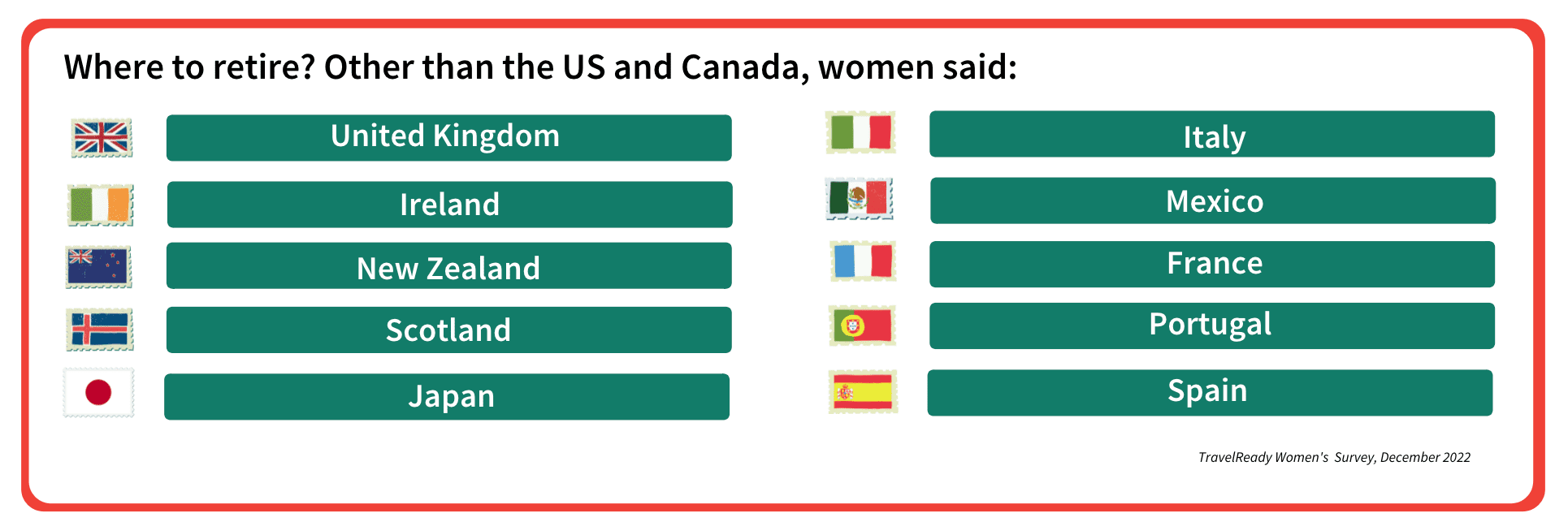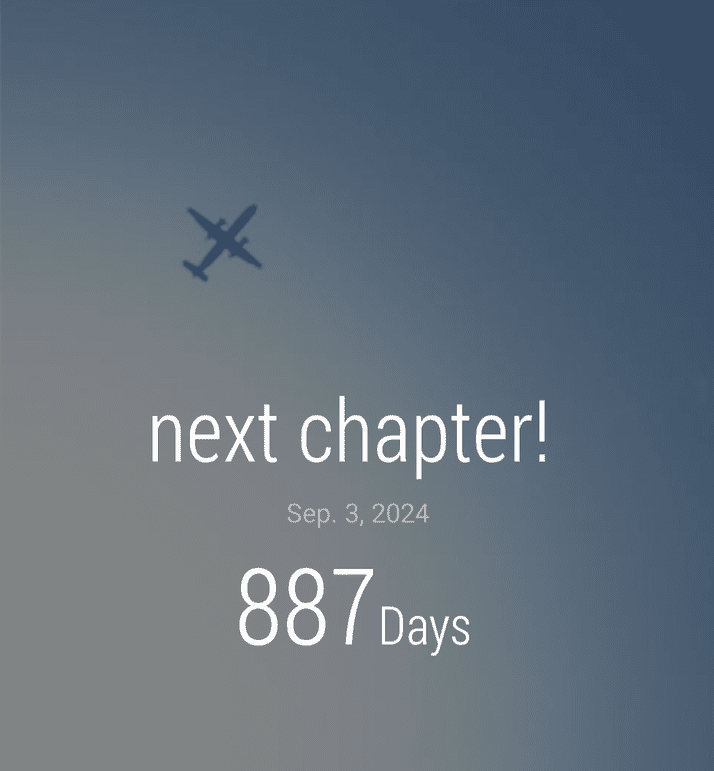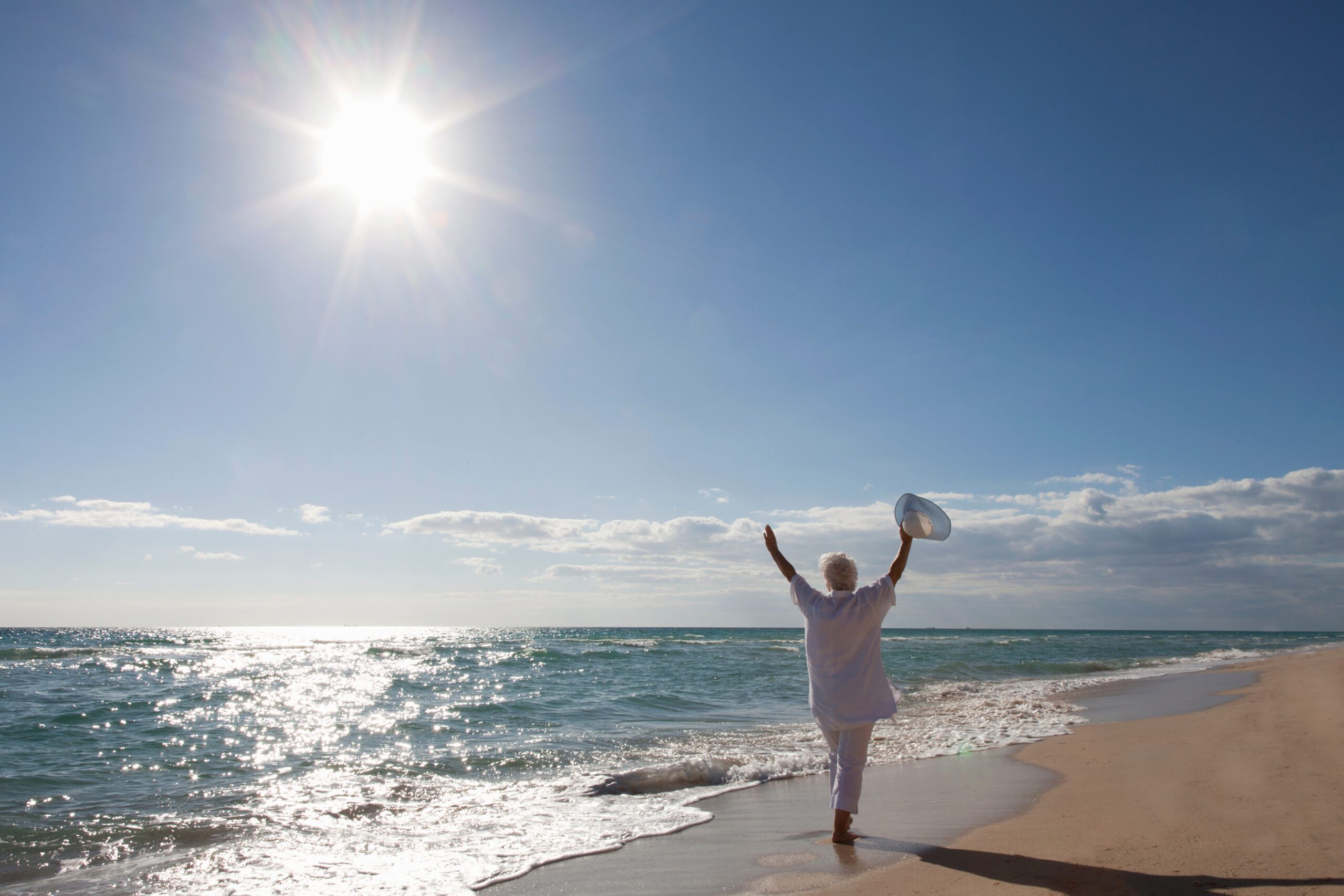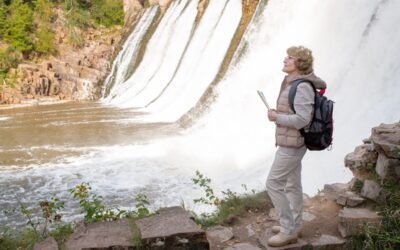Last updated on August 19th, 2024
Featured image: Planning a life of travel during retirement? This could be you! | Photo by Envato Elements.
Six tips to decide where to live and travel
by Sue Janzen
For many of us, life fits handily into chapters. Early years, often with a focus on education, marriage (and sometimes the moving on from its end), child rearing and many years of career development.
Once we reach our mid-to-late 50s, thoughts begin to turn to retirement in its various forms. Retirement from raising a family, from creating a career, from a focus on building our lives. The shift from building to sustaining might be slow and prolonged but once it starts, a new chapter begins to take shape.
Retirement is a word that evokes complex emotions such as anticipation, uncertainty, empowerment and fear. After many years of focusing on my career, this is the phase I’m entering now. With just a few years of working life left, and as I dream of travel taking the place of my familiar 9-5 workday, I’ve begun to experience each of these emotions and more. My parents are both gone, my siblings and their families are scattered across North America and I don’t have a partner to consider. With the realization that my options are unlimited, I have started to question – should I stay or should I go?
As I consider my options, I think about the pros and cons of staying in Toronto. I love my home and community and want to be here in my later years. But, with more than a decade of travel ahead of me before I slow down (finger crossed!), I could relocate temporarily to maximize my travel years.
We recently polled the JourneyWoman community for their collective wisdom, and words like landscape, history, language, climate and safety popped up as factors to consider.
When we asked women where they would consider retiring to, the most-mentioned countries outside of the US and Canada included the UK, Spain, Italy, Portugal and Mexico among others. Clearly, I’m not the only one thinking through all the options.

Six factors to consider when choosing a place to retire
For now, I’ve narrowed my list of considerations down to six main factors. What’s on your list?
1. Cost of Living
What is the cost of living? Most of us will have a lower income when we retire, so how can we stretch our funds? I may rent out my home in Toronto so I can stay overseas for an extended period of time. I could look for house sitting opportunities and stay in smaller towns to save money which will allow me to see more of Europe without having to fly back and forth. Internationalliving.com is a US-based website that has helpful information about the cost of living in various destinations.
You could also consider downsizing your home and life now in preparation for full-time travel post-retirement. JourneyWoman has lots of tips on downsizing, courtesy of Carolyn Ray’s experience:
You can also be more frugal with certain components of the travel experience to stretch your budget and savings further. Here are some ideas for travelling on a budget:
-
- Spend less on flights and more on experiences. With the flexibility of time that comes with retirement, you can fly off season or on less popular days of the week. For example, flights from Toronto to Paris in October or November can range from under $600 to over $1,100 depending on which day you fly. You will also save more by travelling with carry-on only. Get some pack-light tips from expert Anne McAlpin in this article.
- Become a house sitter or engage in house swapping. A quick Google search will give you a list of organizations that facilitate these options. Bonus: You‘ll make new friends along the way! Check out this JourneyWoman article for some options.
- Explore more off-the-beaten-path locations. Small towns have rich histories, too, and can be much less expensive to stay in. Consider day trips into a large city instead of out of one.
- Check out JourneyWoman’s articles on how to travel on a budget.
2. Access to Healthcare
Let’s face it – living in a post-menopausal body can be a challenge. Your job may have had you on your feet all day for the last 30 years, leading to joint pain.
For me, years of sitting behind a desk has also taken a toll. While it would have been ideal if I had kept up the same level of fitness I had when I was younger, the reality is, I have work to do if I want to be an active traveller through my retirement years.
How accessible is health care? Those aches and pains get louder as we age and, as the pandemic has shown, our health situation can change quickly. Travel insurance is a must but may not be enough. How easy will it be to get medical attention in a different country if I need it? Wikipedia has a page listing all countries with (unverified) universal health care which you might find helpful.
3. Climate
What do you want in terms of climate? Most people want warm weather but it’s not the only consideration. When I first started researching the climate in the south of France, most of the articles bragged about days upon days of sunny weather. But there were also stories about the mistral winds that scream at certain times of the year and have caused people to pick up and move. If you’ve only travelled on short vacations, you may not have the full picture. It’s good to understand year-round weather patterns in a location you’re considering. World climate maps such as this one can help with high level information, but it’s best to either choose a location you have visited at various times of the year, or ask specific questions of people who already live there.
4. Personal Safety
There are many criteria to consider when it comes to safety. The Economist Intelligence Unit considers a total of 76 indicators, grouped under the pillars of digital, health, infrastructure, personal and environmental security. At safecities.economist.com, you’ll find several year’s worth of data, including the top 5 cities under each pillar and a tool to help you compare your city to others. You’ll find the Urban Safety Benchmarking Tool in the menu on the left side of the page.
Your country of origin may also have a website with relevant information. The Government of Canada, for example, has a travel advisory website that helps you stay informed about issues from petty crime and road conditions to demonstrations and localized terrorist activity.
JourneyWoman Women’s Safety Survey (April 2021)
In our last safety survey, most women agreed that safety is more about a mindset, and less about the destination. However, women did offer their recommendations based on personal experiences of the countries they would recommend to solo travellers.

5. Visa Requirements
What are the visa requirements and how easy is it to obtain one? It’s not always straightforward! In Europe, for example, understanding and staying on top of the Schengen Area (which now is a region of 29 European countries that have abolished their internal borders to allow the free and unrestricted movement of people according to SchengenVisaInfo.com) 90-day rule can be complicated. This website contains valuable information about visas around the world.
6. Transportation
How important is transportation? I’m very comfortable driving in downtown Toronto, but I prefer to not have to think about driving when I travel. I want to be able to relax and take in my surroundings. It’s important to me that I live close to train stations or airports so I can move about easily without having to own or rent a car. Rome2Rio.com is my go-to source for transportation options. OMIO is another good option.

Sue’s countdown to travel freedom app
For now, I only dream of the opportunities that lie ahead of me in this ever-changing world. But research and thoughtful consideration is important and I hope to be as prepared as possible when I’m ready to leap into the next chapter.
I’m excited about the possibilities and need to keep reminding myself that the only limits are the ones I impose on myself.
When I find myself saying ‘Oh, I couldn’t possibly do that!’, I challenge myself to think it through with a courageous heart. Rent my condo out and hit the road for a year or two? Of course, there will be challenges, but what’s stopping me? Will I be lonely? At times, yes. But I’ve been lonely at home, too. Will I have enough money? I’ll need to make some adjustments and may need to change my expectations, but I’ll figure it out. Will it be safe? It will if I pay attention, just as I do at home.
As my colleagues talk of learning plans and career development, I now look for articles and videos about retirement. Instead of looking for mentorship at work, I now seek out women who will inspire my next chapter. Women I find every day in the JourneyWoman community.
The Countries I’m Currently Considering
Portugal (score – 4/6)
Portugal hits the right notes with climate, cost of living, accessible health care and more. The biggest challenge with Portugal is that it falls within the Schengen Area, so I wouldn’t be able to stay for a full year. It’s also a bit limited in terms of quick trips into neighbouring countries if I want to stick to train travel, so gets a lower score on transportation.
Canada (score – 5/6)
Of course, maintaining my current home base is a consideration. My friends, family and community are here, the health care system provides for all my needs, and the climate is … familiar. But living in downtown Toronto leaves me craving nature. Air travel is also expensive within the country and flying overseas to access those dreamy European villages requires finances and effort.
France (score – 5.5/6)
France is at the top of my list because of its high-speed rail service, proximity to neighbouring countries, accessible health care and climate. The biggest challenge, again, is the Schengen Area time limit. I gave it an extra half a point because the French I learned in school becomes unlocked from deep in my brain when I visit and I’m keen to exercise that muscle. Babbel is also a great way to brush up on any language.
For now, I only dream of all the opportunities ahead of me. But thoughtful consideration is important too. That way, when I’m ready to leap into that next chapter, I am doing so with a sense of what I need and want and have several years of solid research behind me.

Sue can easily picture herself settling into a small community in France
More Inspiring Reads to Empower Women
When Something Goes Wrong: What to Do if You’re Injured While Travelling
Anything can happen on a vacation. Here are some first-hand tips for women to plan for an unexpected injury.
Catering to Solo Women of All Ages: A Q&A With Phyllis Stoller, Founder, Women’s Travel Group
Visionary leader Phyllis Stoller, founder of The Women’s Travel Group, shares how her itineraries can help women get started in solo travel.
Getting Naked In Japan: A Journey Out of My Comfort Zone
Adventure travel and cultural immersion teach valuable lessons in a women-only trip to lesser-travelled areas of Japan.







Other important things to consider are your own personal finances and your country’s rules regarding retirement, tax, also tax/working rules etc. For example I live in NZ (a long way from everywhere!), we have an automatic pension for the elderly, funded by everyone’s taxes. Self-funded superannuation has only recently been encouraged for all. But… currently (2022) if you are “on the pension” but stay longer than six months outside NZ, you will lose the pension until you return to NZ. Even if you have paid tax here your whole life.
Also some people may have digital nomad work to add a little extra cash (for example I am a proof reader as a side hustle to my full-time job, and plan to continue doing proof reading once I go on my long overseas trip). Can you (legally) still do that in the country you stay in? Will you need to pay tax there? Will your own country still expect you to pay tax on money you earned (and have already paid tax on!) elsewhere – I’m looking at you USA!
Finally, consider the ex-pat situation. It’s a lot easier to settle into a foreign country if there are already other expats there. Just don’t fall into the trap of never associating with the locals because you’re too busy associating with the ex-pats.
OH… I left out – human rights. If certain rights are important to you, be aware that in other countries they may not exist.( Don’t expect 2nd Amendment rights in other countries!) As a woman, it’s important to me that a country I am spending a long amount of time in does not treat 52% of its population as less worthy of the rights that the other 48% take for granted.
Enjoy your travels 🙂
I am thrilled that I found journeywoman.com. I just returned from a trip to France & Spain. It was wonderful and got me thinking of retiring in Europe- I am 59. This article came at the right time and I am super excited to begin to look into where would be the best place for me. Your website & articles have so much information that I am confident in my choices. Thank you for the numerous resources.
Amazing blog! Thanks for information